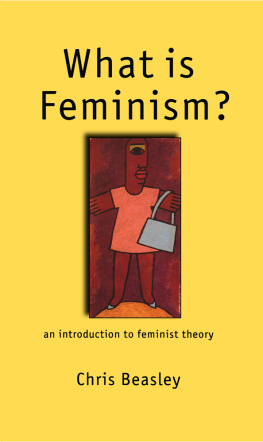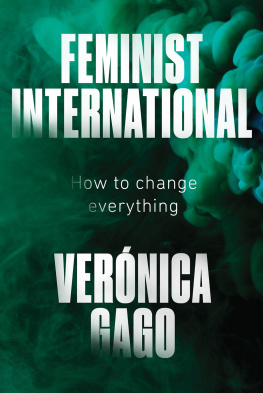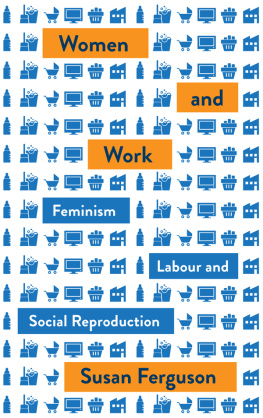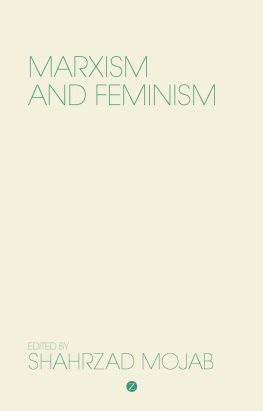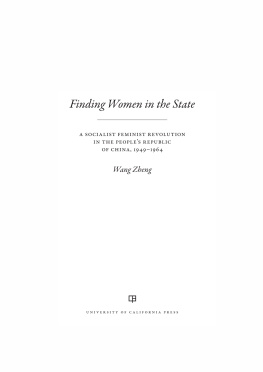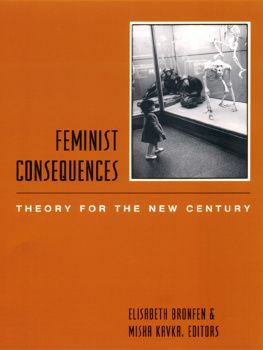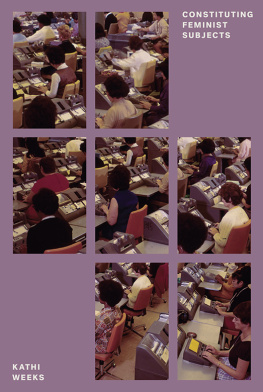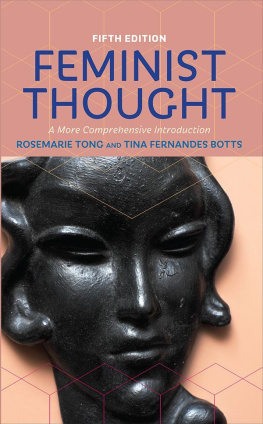Sexual Democracy
Feminist Theory and Politics
Virginia Held and Alison Jaggar, Series Editors
Sexual Democracy: Women, Oppression, and Revolution, Ann Ferguson
Gender, Identity, and the Production of Meaning, Tamsin E. Lorraine
Rocking the Ship of State: Toward a Feminist Peace Politics, edited by Adrienne Harris and Ynestra King
Reproducing the World: Essays in Feminist Theory, Mary O'Brien
Sexual Democracy
Women, Oppression, and Revolution
Ann Ferguson
University of MassachusettsAmherst
TO ANNETTE KUHN
for friendship as well as theoretical and logistical support when I needed it most
First published 1991 by Westview Press, Inc.
Published 2019 by Routledge
52 Vanderbilt Avenue, New York, NY 10017
2 Park Square, Milton Park, Abingdon, Oxon OX14 4RN
Routledge is an imprint of the Taylor & Francis Group, an informa business
Copyright 1991 Taylor & Francis
All rights reserved. No part of this book may be reprinted or reproduced or utilised in any form or by any electronic, mechanical, or other means, now known or hereafter invented, including photocopying and recording, or in any information storage or retrieval system, without permission in writing from the publishers.
Notice:
Product or corporate names may be trademarks or registered trademarks, and are used only for identification and explanation without intent to infringe.
Library of Congress Cataloging-in-Publication Data
Ferguson, Ann.
Sexual democracy: women, oppression, and revolution /Ann
Ferguson.
p. cm. (Feminist theory and politics)
Includes bibliographical references (p. ) and index.
ISBN 0-8133-0746-5 (hc.) ISBN 0-8133-0747-3 (pbk.)
1. Sex roleUnited States. 2. FeminismUnited States.
I. Title. II. Series.
HQ1075.5.U6F47 1991
305.42'0973dc20 90-21084
CIP
ISBN 13: 978-0-367-28713-9 (hbk)
I thank those who gave me extensive comments on the new essays in this book: Leonard Harris, John Brentlinger, Nancy Folbre, Sam Bowles, Cindy Patton, Batya Weinbaum, Jeffner Allen, Paula Rothenberg, Tom Wartenberg, Iris Young, and Sarah Begus. Those who helped with the previously published essays are thanked in endnotes to those chapters. Thanks also to the Socialist Feminist Philosophers Association (SOFPHIA) and the Radical Philosophers' Association (RPA) for their continued feedback. My colleagues at the University of Massachusetts and in Five College Women's Studies have been important for a grounded feminist intellectual community as have my supportive colleagues in the Philosophy Department. I also thank my political activist friends in feminist and solidarity work; my music band, The Diggers; and my extended family of kin and sex/affective friendships. Finally, thanks very much to Spencer Carr, Marykay Scott, and Alice Colwell of Westview Press for their patience and aid in the various revisions of the manuscript. Finally, thanks to Carol Shea for intellectual, political, and sex/affective care throughout the book process.
Ann Ferguson
One
Introduction: A Personal and Political Feminist Odyssey
For the last fifteen years I have been engaged in developing a theory of male dominance that creates a feminist-materialist methodology and categories for understanding systems of patriarchy. Feminist-materialism, which discusses racial and class differences among women, discusses the limitations that these place on the radical potential of the women's movement.
I study variations across lesbian cultures to explore the political implications of differences between women for feminist theory. In the last three chapters, I evaluate the future of U.S. socialist-feminist visions and politics in the light of the successes, failures, and radical changes in state socialist countries such as the USSR and those of Eastern Europe.
Why call the book Sexual Democracy? In a way this title anchors the intellectual and personal odyssey that I and many other left-wing feminists have made since the beginning of the second-wave women's movement of the 1960s and 1970s. Not only did I begin to see personally and theoretically that heterosexual sex is a site for male dominance that Marxism had ignored, I also had to come to terms with the absence of a sufficient theory of the importance of political democracy in all its forms, either in mainstream or in leftist political theory. In the process of coming out as a lesbian, I had to develop a theory that justified supporting a pluralist coalitionist politics for feminism rather than a lesbian separatist position. Finally, because my life as the mother of an adopted black child is always on the margins of the white and the African-American communities, I had to understand how the visions of sexual democracy of peoples of color differ from those of white, middle-class feminists and need to be respected and understood if any effective progressive coalitions to fight sexism, racism, and capitalism are to be built.
Thus I decided to write this introduction on two levels: first giving a history of my personal and political experiences as background to my theoretical development, and then outlining how the theoretical and political positions I take in these essays connect to a history of the major feminist disputes during the period.
Stage 1: 19611977
Personal: Experiences with the Civil Rights and New Left Movements
I spent the period from 1961 to 1973 involved with the New Left, supporting the civil rights, student, and anti-Vietnam War movements. In order to make sense out of the Vietnam War and of imperialism in general, I studied Marxism and became convinced that U.S. and international capitalism had structural tendencies that not only created class exploitation at home but also made it impossible for the United States to support full democratic rights to self-determination for peoples in the underdeveloped world who resisted U.S. imperialist exploitation. From the Marxist perspective, racism and sexism are secondary effects of the capitalist system used to divide and conquer the population in order to maintain ruling-class hegemony. I was a rebel who needed a simple, unitary system of thought with a tidy "unite and fight" politics. To think of capitalism as the basic enemy allowed me a comforting political strategy, overwhelmed as I was with the magnitude of the problems of social domination I was discovering. I could keep my family and male and female friends located in one undivided counter-culture from which I did not have to separate in order to fight social domination in all of its forms.
Through the early 1960s I was involved primarily with the civil rights movement. I worked on fair housing issues when I was a graduate student in Providence, Rhode Island, went to the 1963 Martin Luther King, Jr., "I have a dream" rally in Washington, D.C., and when I got my first teaching job at the University of Massachusetts in 1964, I spent a summer working with the Congress of Racial Equality (CORE) in Springfield. That was not easy for a white woman, especially a young academic in a working-class neighborhood; black men who wanted to go out with me were constantly testing me to see if I was racist. Because I had a (white) boyfriend at the time, I had what I thought was a good excuse, but it didn't prevent sexual advances by my black male acquaintances, which I found alternately annoying, frightening, and exciting. From my own experience, there is no denying the special attraction between white women and black men that caused frictions in civil rights organizations (cf. Evans, 1980) and problems for sisterhood between white and black women because of sexual jealousies and rivalries. I found myself a subject of jealousy because married black men were flirting with me, and unattached black men also paid more attention to me than to the black women in the organization. At the same time, all of us, as women, were expected to defer to black male leadership. (There were very few white men in the organization in Springfield.)


